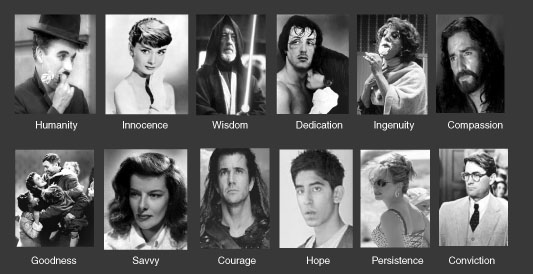Out of the Tower and Into the World
I’ve always thought it unfortunate that a writer is so often portrayed as a reclusive, uninvolved, uncaring idealist who spends more time with his head in the clouds than with his feet in the real world instead of an engaged, outgoing, tenacious truth-seeker who is up to his elbows in the stuff of life and passionately and creatively uses his words to relay his experiences to us all.
Unfortunately, it’s all too true that many writers spend more time with their PCs than with people, are found more often in cozy dens than in corner cafes, and seem to be more concerned with character arcs and plot points than in pursing stories and causes that could change the world.
What readers really want – and need – are literary trailblazers to escape their ivory towers and jump into the fire of life into those intimidating and soul-stimulating places that the average person can’t or won’t go. And then tell us what they've discovered.
Rough riding former President Teddy Roosevelt gave great advice for life and screenwriting when he wrote, “It is not the critic who counts; not the man who points out how the strong man stumbles, or where the doer of deeds could have done them better.”
We’re all surrounded by critics, whether personal or professional.
“The credit belongs to the man who is actually in the arena, whose face is marred by dust and sweat and blood, who strives valiantly; who errs and comes short again and again;… who knows the great enthusiasm, the great devotion, who spends himself in a worthy cause…”
Are you convicted, motivated, and stirred yet? Keep reading.
“…who at the best knows in the end the triumph of high achievement and who at the worst, if he fails, at least he fails while daring greatly. So that his place shall never be with those cold and timid souls who know neither victory nor defeat.”
I don’t know about you but I’d rather read a story from a dusty, sweaty, bloody, battle-worn, daring gladiator than a safe, satisfied, presumptuous, timid critic any time.
I admit there’s a time for the comfort, security, and solitude of an ivory tower because living life with your feet to the fire can get you burned and burnt out if you spend too much time there. But I think writers - and their audiences - would be better served if they spent far more time in the intensity, thrill, and vivacity of life's turbulent fires than in their pretty, predictable, and presumptuous ivory towers, which should really only be temporary housing.
Are You an Accessible Writer?
The world needs screenwriters.
People who can blaze new frontiers of thought and vision, create compelling stories that inspire and stimulate, and communicate captivating parables that define and challenge us.
And screenwriters need the world.
Consider for a moment the following people who are essential to a film's success (certainly not a complete list): readers, agents, managers, producers, directors, actors, cinematographers, location scouts, investors, editors, sound editors, composers, set designers, costumers, makeup artists, publicists, advertisers, distributors, and, of course, audiences.
Film is a mass medium and if your writing is not reaching (and incorporating) the masses, you may be in the wrong business. And while stories may be written in ivory towers, they certainly aren't purchased, produced, promoted, or played there.
And if you want to be a working (and compensated) screenwriter, you'll need to know how to lay aside your pioneer's compass, pull on a pair of overalls, and become more of an active part in this people-populated enterprise.
An "accessible" writer is one who is willing to work with others. He lets others in. He communicates with people. He knows his industry. He plays well with others. He isn't isolated. People can reach him - physically, intellectually, and emotionally. People want to reach him because he's knowledgeable, good at what he does, and likable.
An "inaccessible" writer is detached and distant. Overly opinionated. A maverick for maverick's sake. Often out of touch, out of range, out of reach. He's impossible to communicate with or relate to. He doesn't "do" lunch, team sports, attract or include others, or do anything he doesn't want to do, often at the excuse of "that's just who I am."
Screenwriters need to aspire to walk that tricky tightrope between the solitary pursuit and passion of the long distance runner assaulting a marathon and the precision and teamwork needed to run the anchor leg of a mile relay.
Like the picture below, screenwriters, like burly white tigers, though often inherently unpredictable, solitary, moody, and other-worldly, need to come out of their cages more often and play with mere mortals.
Why Not Gain From Pain?
One of the clients I work
with is a company that optimizes training for triathletes, particularly
IRONMEN. You know, the guys who swim 2 and a half miles THEN bike 112 miles
THEN top it off with a marathon. These people are no strangers to pain,
breaking down and through barriers, and pushing themselves to the limits. In
fact, they thrive on it.
Whether its navigating through rough open water, scaling a monster hill, or struggling to the finish line after 12-18 hours of physical demands, triathletes know that handling pain is a necessary part of the sport. They also know that it's just as much a mental challenge as it is a physical one and screenwriters could learn a lot about how to overcome the numerous “pains” in their world from these elite athletes who conquer theirs.
FACE THE PAIN
Whether its navigating through rough open water, scaling a monster hill, or struggling to the finish line after 12-18 hours of physical demands, triathletes know that handling pain is a necessary part of the sport. They also know that it's just as much a mental challenge as it is a physical one and screenwriters could learn a lot about how to overcome the numerous “pains” in their world from these elite athletes who conquer theirs.
FACE THE PAIN
To a triathlete, pain is not a foreign term or an ambiguous possibility. It's inherent to and even essential to what is triathlon. Triathletes don't shy away from it. They don't quiver at its arrival. They don't run away when it surfaces. It's just another leg of the race and to be expected. Fatigue, injury, "the wall," and even mental strain is par for the course.
Screenwriters would be wise to take a similar mindset with the "pain" they experience. We all know that rejection, writer's block, unrealistic deadlines, inaccessibility to producers, and self doubt are very realities in our world. Shying away from them or pretending they don't exist is ignorant, foolish, and unproductive.
EMBRACE THE PAIN
The triathlete not only
acknowledges pain, he invites it in for an early morning job. He takes a look
at this monster and probes and analyzes its source, form, and reason for being.
Aches and pain, fatigue, mental trauma are entities that the athlete can look
out for and listen to in order to improve performance. Am I training too hard?
Am I injured? Do I need to push through?
Similarly, the screenwriter can welcome obstacles, distractions, and deferments of his goals and use them to reach levels of excellence he didn't know existed. Am I overwriting? Do I rely too much on the approval of others and fail to write from my gut? Do I need to apply more structure to my work ethic?
RACE THE PAIN
Going beyond simply acknowledgement and
embracing the pain, the true elite athlete learns to take this familiar foe and
use it to reach higher goals. Success, comfort, and ease seldom motivate you to
be your best. It's usually only your foes, heartache, and rejection that force
you to make radical changes in substance and style. Triathletes befriend the
enemy, pain, and ask them to come along for a training session to see what it
can teach them.Similarly, the screenwriter can welcome obstacles, distractions, and deferments of his goals and use them to reach levels of excellence he didn't know existed. Am I overwriting? Do I rely too much on the approval of others and fail to write from my gut? Do I need to apply more structure to my work ethic?
RACE THE PAIN
The screenwriter can do the same. When writer's block, rejection, and closed doors face you, power through them, go beyond yourself, and do whatever it takes to overcome the obstacle. Treat the foe as friend and you'll find the energy and creativity to become as successful as you have the guts to become.
Notice there is no final ERASE THE PAIN stage because, as suggested earlier, pain is a part of the process of both athletic excellence and artistic mastery. One can never defeat the foe, only live with it and learn from it. As three-time Tour de France winner Greg Lemond says, "It never gets easier, you just get faster." Plus, what would be the fun - or fulfillment - of an easy victory? It's the races where you overcame the impossible that you remember years later.
Face the pain, embrace the pain, and race the pain: that's what a triathlete does to become an IRONMAN. Do the same with your screenwriting with equal amounts of guts, fire, and determination and you'll become an IRONPEN - and your life and the world will never be the same.
The Little Screenwriter that ... Did!
I always thought the best-selling children's classic "The Little Engine that Could" should be re-titled because it's not that the perky, little blue engine merely COULD do something about the dilemma that faced him. It's that he DID.
We all know writers who CAN script a wonderfully compelling story. Many more who DESIRE to put down a captivating adventure on paper. And still more who feel INSPIRED and even "CALLED" to change their world through visual storytelling.
But very few actually DO anything about it.
They don't write that awkward first draft. Or spend months rewriting and re-crafting storylines and character arcs. Or spend even more time honing that script until it comes alive and jumps off the page. Or pick up the phone and call a producer and pitch their heart out.
Maybe because it's easier to come up with a dream than it is to work it out. Or because the rejection you face along the way can be devastating. Or that the competition is incredible. Or that the industry is too intimidating. Or that you don't have the time, the will, the resources, the connections ...
The fact is, it's the little engines - and screenwriters - who DO something about their abilities, inspirations, and aspirations that get the job done - and save the day. Not just those who CAN.
I could spend a lot more time on the motivation and methodology of "getting things done" but I'm getting way too convicted... and I've got things to DO.
Too Many Principles, Not Enough Passion
If you listen to enough screenwriters, read enough industry articles and books, and attend enough seminars and conferences, you'll soon have heard so much about plot points, character arcs, dialogue and page lengths, and the latest trends in the industry that you'd think writing a screenplay is more like solving a complicated calculus problem than writing a personal, passionate, engaging story.
And while principles and precepts are essential to the process of crafting an engaging and compelling script, they can also be too exacting, too limiting, and too much work in approaching the craft which so many of us love.
First of all, PRINCIPLES ARE POWERFUL. They give substance, direction, focus, and a framework on which to build your stories. As spontaneous as most writers propose to be, they still need a method to their madness.
If you want to drive from Dallas to LA, you would be wise to get a map before you head off into the horizon. Others before you have followed one and successfully travelled there. You'll be able to do the same. Time-honored principles are time-honored because they work, they work well, and others love and even expect them to be used.
But OVERUSE AND MISUSE OF PRINCIPLES CAN RENDER YOUR WORK PASSIONLESS if applied for their own sake and with an unwillingness to adapt throughout the creative process. We see it all the time when a writer tries to force his story into a rigid, sterile mold and ultimately ends up writing a rigid, sterile story.
Yes, you need a map to get from Dallas to LA but sometimes you have to take a detour or alternate route. In fact, if you're too rigid, you may miss out on the fact there there may be an easier or more effective way of getting where you're going. You may even find out you want to head off to an entirely new location.
The point is to LET THE POWER AND PASSION OF YOUR PIECE BE PERFECTED THROUGH A PRAGMATIC USE OF PRINCIPLES. Once you've followed your outline and solid storytelling precepts and splashed your initial insights down on paper in all their rawness and fervor, you can then revise your work based on the initial passion of your story and be as creative as your heart desires.
In subsequent drafts, you can follow a revised outline and use additional principles of good craftsmanship to hone and chisel concise and clear dialogue, further develop plot points that drive your story forward, and add description that adds insight and color, all the time re-instituting the energy and inventiveness that birthed your story.
And in your final drafts, when your characters have appeared, your story is defined, and your themes are enmeshed, you can start drawing outside the lines, being creative, letting the story come alive, and being spontaneous.
So, read the books. Know the rules. Go to the seminars. Study the industry. But keep the original passion alive at the beginning, middle, and end of your story and you'll end up with a powerful, passionate, and principled story.
Subscribe to:
Comments (Atom)

















